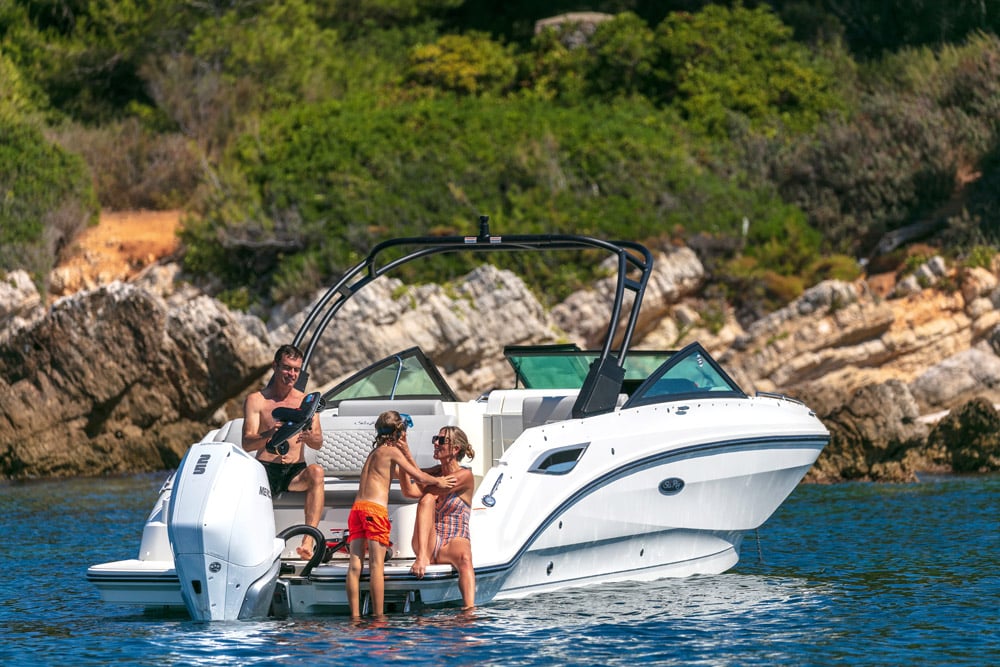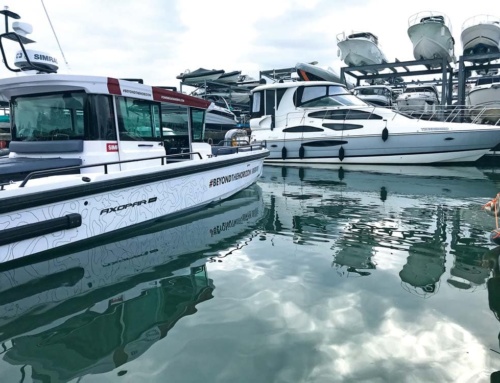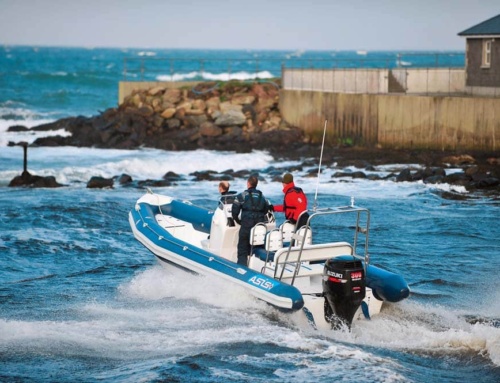HMS relates his experience of how his own interest in offshore adventuring began and invites leading RYA powerboat instructor Paul Glatzel to give us his top tips on how to develop those all-important skills that make boating both fun and rewarding.
When and how did your interest in boating begin? Was it thanks to your parents and upbringing, perhaps a keen boating friend, or maybe something you read or watched? Whatever or whoever proved to be the catalyst, no doubt you’d agree, it set you on a voyage of discovery …
Although, living in Cornwall, I had been brought up around boats, my interest, certainly from an offshore boating point of view, was first sparked by a striking picture I saw illustrating an article published in Motor Boat & Yachting magazine back in the late 1980s. The story related the account of a brace of Delta RIBs being taken on a summer voyage out to the Shetland Isles. To this day, I can clearly recall the image of those bright-orange craft climbing the back of that big, rolling, offshore swell and those vivid crested wave tops. Meditating on the picture stirred within me a sense of adventure that I wanted to experience for myself.
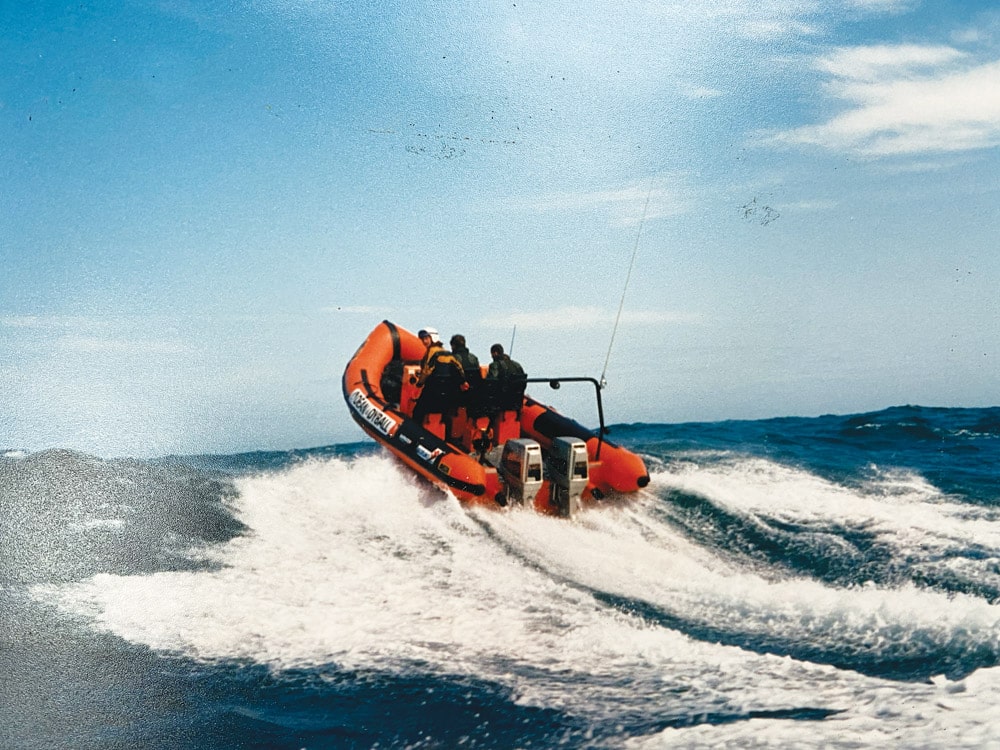
The 1990 image that started it all! Charles Dyas and crew onboard a 7m+ Delta RIB, taken by Chris Kaye.
Contemplation to innovation
Fired by the imagery and tale relayed in that original magazine article, in time, my wife and I became the proud owners of a small but capable RIB – whereupon, after a couple of years or so of small-boat high jinks and a process that involved a good deal of trial and error (thankfully, all of which we survived), we gradually learned the ropes and began to acquire a reasonable amount of practical knowledge.
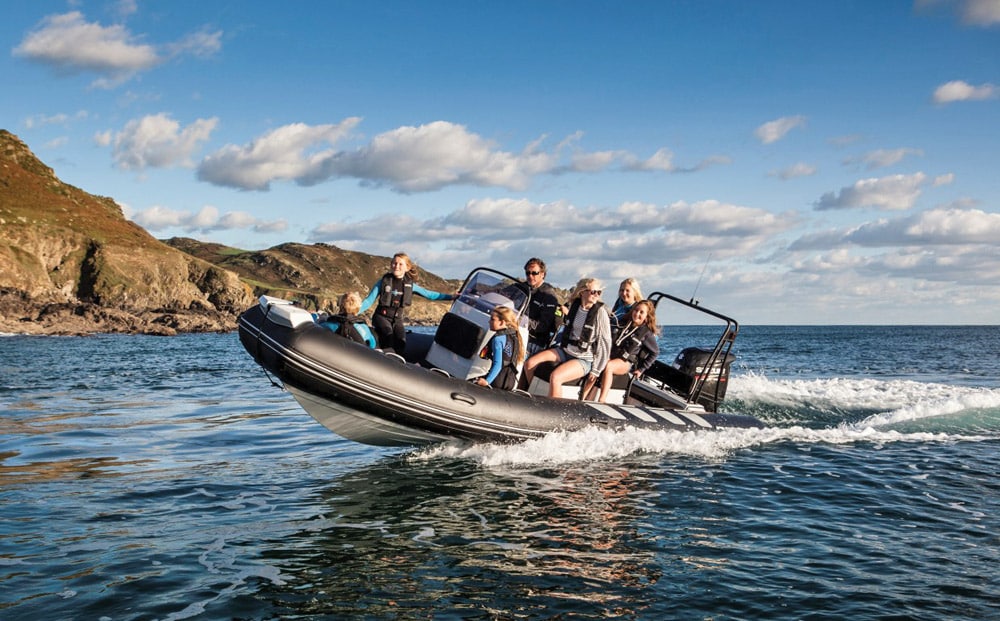
As it was our goal to go and explore that coast and undertake extended voyages, we took great enjoyment from testing the merits of our own abilities, and those of the boat. This included thinking through all the ‘what if’ scenarios we could imagine and then devising methods that might allow us to be as self-sufficient as possible at sea. For instance, we devised our own self-righting apparatus for the vessel’s stern arch, and also a fuel tank system that increased the boat’s fuel capacity by some four times. We rigged a winch and tackle system that aided the single-handed attaching of the auxiliary engine without losing it over the transom! Innovations of this kind were not only rewarding and a lot of fun to create, but also gave us even more reason to get on the water with a purpose in mind.
Experimentation
Sea-trialling new ideas therefore proved very educational, as did experimenting with different sea states. As far as possible, we always tried to keep the latter within the bounds of quantifiable risk by taking measures that ensured we maintained an element of control. But I wanted to know the strengths and the weaknesses of our boat, so that if we did encounter a sticky situation, we would better understand the boat’s tolerances, etc. In line with this, we did some quite serious testing in known hot spots such as tidal overfalls and shoaling waters where we could systematically learn new helming techniques as well as discovering in real time how the boat would behave in troublesome or demanding sea states. In the process, we gained invaluable experience in terms of handling bigger seas and even breaking waves.
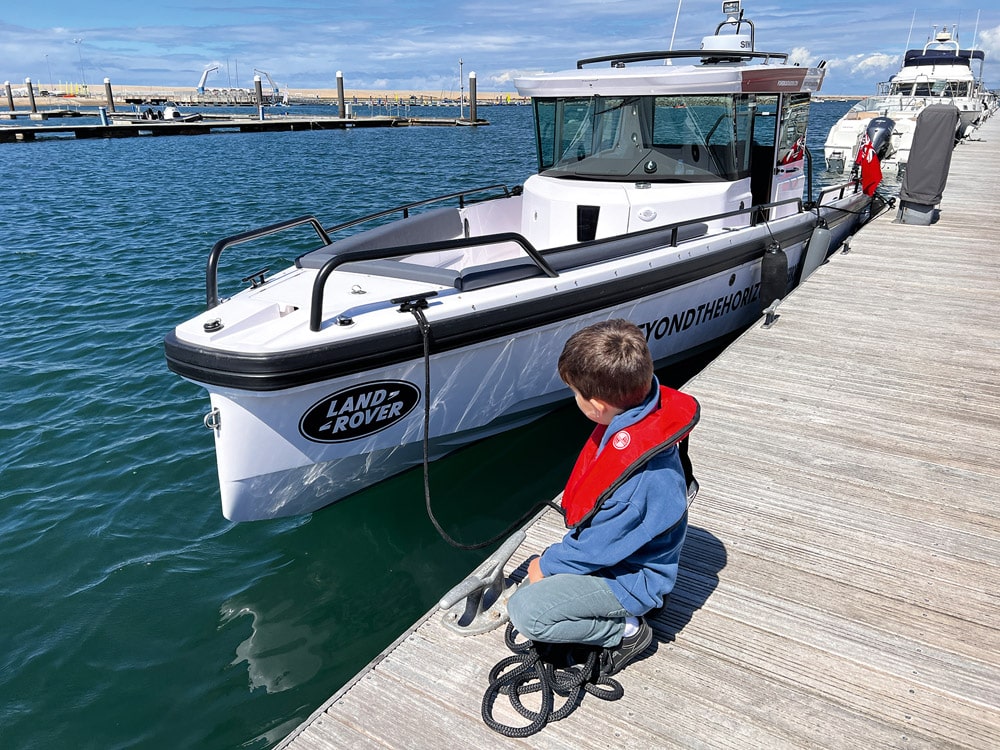
Getting little ones involved at an early age
In an effort to cover every outcome so as not to be caught off guard, we experimented with such things as sea anchors and drogues. I remember too we even did man-overboard exercises, and on more than one occasion filled the boat to its gunwales to see how it would fare when swamped! This was invaluable for better understanding the realities of a situation, including how, not only the boat, but we ourselves, might cope in such a situation. It also revealed the shortcomings of such things as auxiliary fuel tanks and how, if not properly strapped down, they would float about on deck, and also how a battery not secured sufficiently above the potential flood line could be compromised. We discovered the frailty of scupper ports too, which were inadequate to allow for the fast and safe exiting of deck water. Our view was that it’s far better to discover these types of shortcomings within the context of a situation you’ve engineered yourself than it is to learn the hard way in a scenario not of your making! Importantly, too, we studied other people’s boats and how they were kitted out and adapted for different uses.
Practical knowledge
We may not all want to go extended cruising or small-boat adventuring in demanding sea states, but the gaining of practical knowledge is certainly rewarding and does much to increase your chances of survival if things do go awry. Inshore or offshore, the sea is a hostile environment, so respecting it and maintaining a healthy fear of it will actually form the basis of deriving one’s maximum enjoyment from it. But wherever you are on your ‘voyage of discovery’, like life itself, you’ll find that there will always be more to learn. But isn’t that where the reward lies?
Featured throughout this article are some great top tips as provided by our very own expert, Paul Glatzel. Paul not only teaches newcomers to the world of boating, but also, seasoned professionals seeking to advance their knowledge and practical seamanship. Paul’s short, pithy contributions are derived from his many years of experience as a family boating man as well as his ongoing accumulation of knowledge as a professional mariner and RYA instructor. I’m sure you will find his quick reference top tips to be of value to your own ongoing ‘voyage of discovery’.
PAUL’S TIP 01
Being a great skipper comes from being a humble person who appreciates their own strengths and weaknesses and who delights in developing the skills of others. A great skipper has a total focus on safety, gives clear briefs to those on board and delegates responsibility for aspects of the craft’s operation. A great skipper steps back and lets others learn, but at the same time is alert to dangers and additional learning opportunities. If it starts to go wrong, they are prepared to step in and take responsibility, and they will never shame or humiliate others as they learn. The feedback given is always positive and constructive.
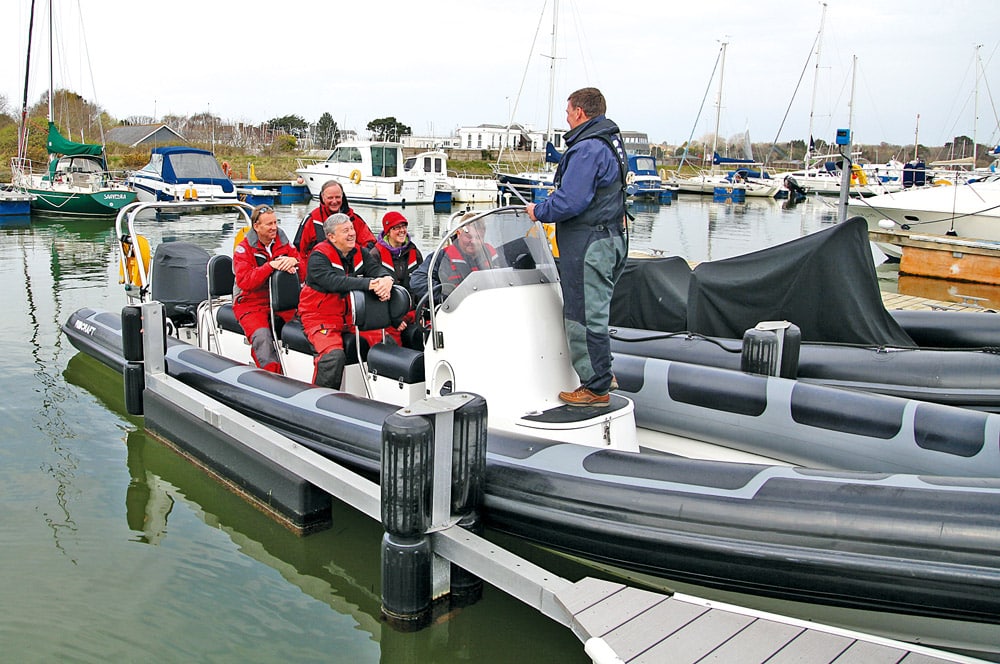
A great skipper steps back and lets others learn, but at the same time is alert to dangers…
PAUL’S TIP 02
Get trained! It’s not a great surprise that this tip comes from me, but boating should be fun and relaxing, which comes from being knowledgeable, competent and getting plenty of practice. Whether it’s formal RYA training courses or bespoke training matters less than ensuring that you are getting great input and that the training stretches your mind and develops and refines your skills. Get trained by different people and experience different boats and locations as a means to broaden and deepen your skills. At all stages of learning, keep an open mind and challenge your own preconceptions.
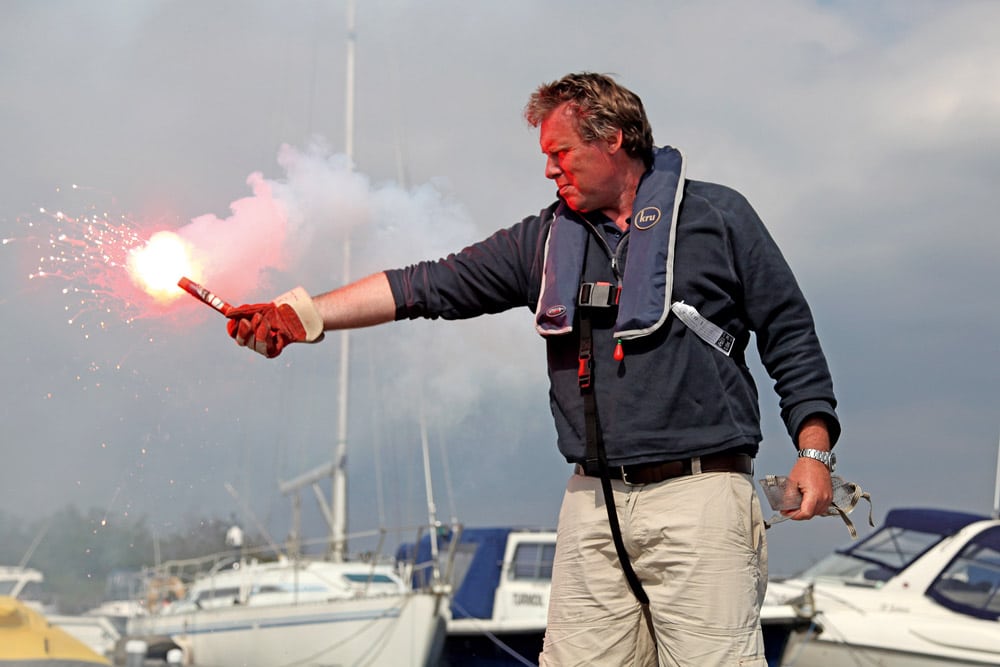
Learn how to use safety equipment properly
PAUL’S TIP 03
APE! This stands for ‘Assess, Plan and Execute (with an escape route)’. In my experience, powerboaters quite often get in a bit of a mess in marina situations because they fail to fully assess the environment before they start their approaches to a berth. Assess the way that the wind is blowing and affecting the vessel; assess how the stream/tide is going to impact the approach; assess the depth and the presence of other vessels. In light of that assessment, create a plan, then execute it with an escape route always in mind. Remember: a good skipper will always stop and re-approach rather than push a bad position.
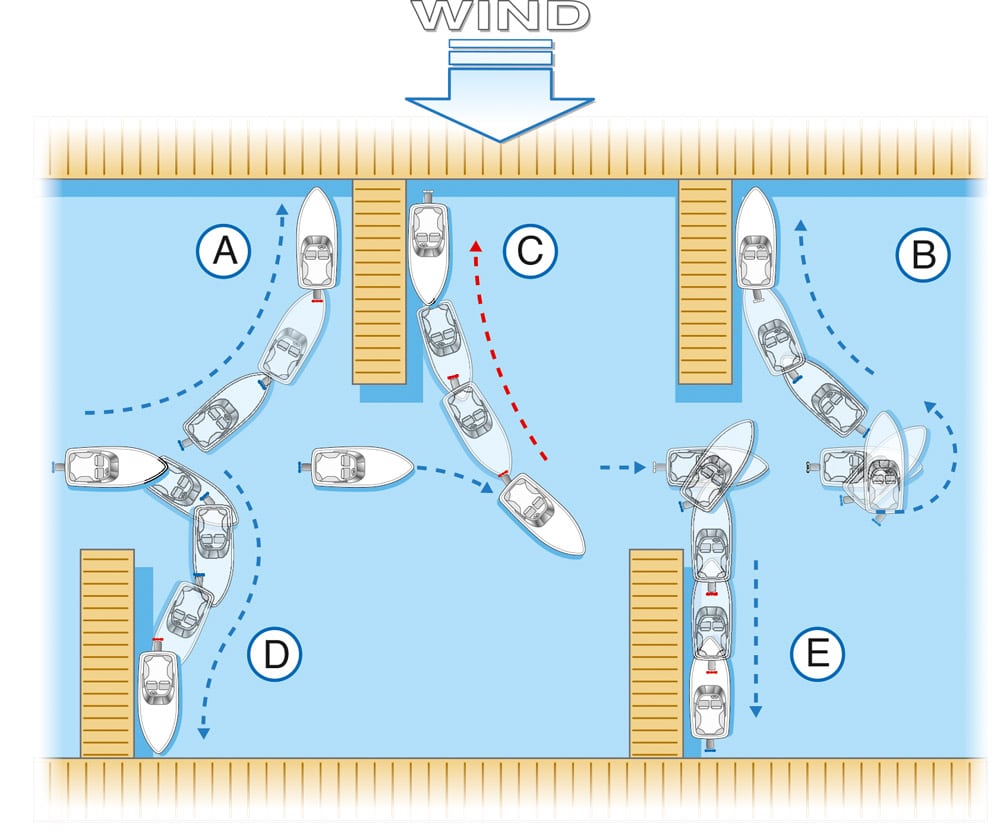
Mooring in a marina diagram
PAUL’S TIP 04
Read widely! For me, developing as a boater was about reading widely; nowadays, it’s about viewing the likes of YouTube and searching via Google to find articles, websites and blogs of interest. I remember as a relatively inexperienced boater devouring the books by Dag Pike, especially Fast Boats and Rough Seas, the likes of Heavy Weather Sailing too, and trying to learn from someone who had clearly been there, seen it and got the T-shirt. Finding the Canadian coastguard manual online and learning the strategy behind search and rescue techniques all fed into that desire to learn and understand more, and working out how to simply present boating techniques became the inspiration for the RYA Powerboat Handbooks.
PAUL’S TIP 05
Get everyone involved! Boating is great family fun, but don’t be that skipper who always hogs the wheel and doesn’t develop others. Kids of all ages have brains that are like sponges, and there is no better time to start than when they are really young. Get them tying knots, doing the daily checks, learning how to issue distress and, of course, let them drive the boat (under supervision) at slow and higher speeds. My own kids started on a RIB at about four weeks old, and by the age of eight or so they were able to berth 8m RIBs competently into pretty much any berth!
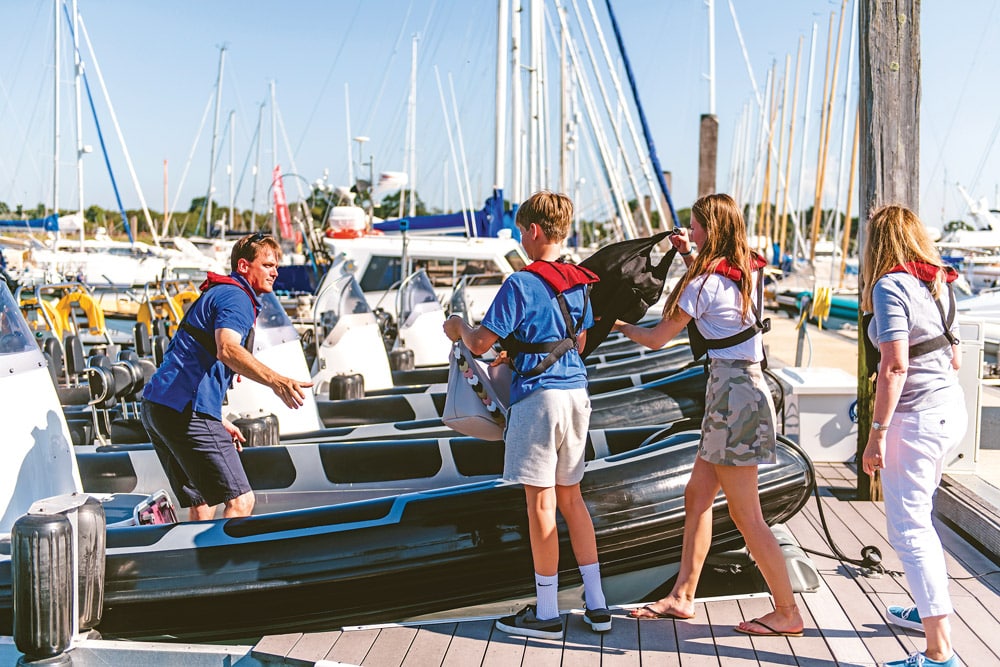
Get everyone involved!
PAUL’S TIP 06
Love the sayings. I have always loved a quote. I also love the sayings that I hear other instructors use with their students, and I have unashamedly stolen a fair few.
“Let the boat do the work” – Says to me: try to resist the urge to always be in gear. Go to neutral and let the boat drift – add in more momentum as you need it.
“If you are going to crash, crash slowly” – Rarely does powering out of a problem help, and generally it just ends up costing more in gelcoat repairs. Never ever risk people’s hands, fingers and toes: if a boat gets damaged, so be it, it can be repaired, but you can’t be.
Mini biog
Paul Glatzel is an RYA powerboat instructor who has trained commercial, leisure and military users across the world. He is the author of the RYA Powerboat Handbook and RYA Advanced Powerboat Handbook and has been a contributor to PBR for over 10 years. Paul is based in Poole and, with Hugo, circumnavigated Ireland on the PBR Round Ireland Challenge.

